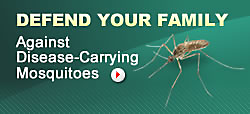Recommended Links

There are many other sites committed to providing you with valuable mosquito information. These are the ones we especially recommend ...
General Info | Mosquito Species | Diseases | Other Insects
General Information
American Mosquito Control Association
The American Mosquito Control Association’s website is filled with excellent information on mosquitoes and their control.
Tiny Mosquito website has a lot of interesting and informative content.
University of Florida’s IFAS Extension
The University of Florida’s IFAS Extension website has detailed information about the mosquito.
University of Kentucky’s College of Agriculture
The University of Kentucky’s College of Agriculture has a very well written article titled, “Mosquitoes: Practical Advice for Homeowners.”
Discover magazine’s fascinating look at mosquitoes.
[back to top]Mosquito Species
New Hanover County, North Carolina
New Hanover County, North Carolina, has a well-written comprehensive website with basic information on each of the mosquitoes found in the county.
Short but solid information on each of the most common species of mosquitoes in the U.S. and Canada.
Rutgers University’s New Jersey Agricultural Experiment Station’s Center for Vector Biology
Rutgers University’s New Jersey Agricultural Experiment Station’s Center for Vector Biology has a wealth of information on mosquitoes and mosquito borne diseases.
USDA’s National Invasive Species Center
The USDA’s National Invasive Species Center contains excellent information on the Asian Tiger mosquito as well as other insects and animals that are considered invasive species.
[back to top]Diseases
The Center for Disease Control (CDC) - Arboviral Encephalitides
The CDC’s webpages on Arboviral Encephalitides.
The Center for Disease Control (CDC) - Malaria
The CDC’s webpages on Malaria
The Center for Disease Control (CDC) - Yellow Fever
The CDC’s webpages on Yellow Fever.
The Center for Disease Control (CDC) - West Nile Virus
The CDC’s webpages on the West Nile Virus. Filled with lots of info, maps, statistics and advice.
American Mosquito Control Association
The American Mosquito Control Association’s website is filled with excellent information on the mosquito-borne diseases Malaria, Dog Heartworm, Dengue, Yellow Fever, EEE, SLE, LAC, WEE and West Nile Virus.
Maryland Department of Agriculture
Maryland’s Department of Agriculture’s website has a very detailed, informative section on mosquitoes and the diseases they transmit including Dengue, Encephalitides, Malaria, and Yellow Fever.
World Health Organization’s Epidemic and Pandemic Alert and Response
The World Health Organization’s Epidemic and Pandemic Alert and Response webpage covers the mosquito-borne diseases Dengue/Dengue Hemorrhagic Fever and Malaria. This site gives up-to-date information on outbreak news and locations.
US Geological Survey
The US Geological Survey’s website contains maps of locations where WNV, SLE, EEE, WEE, and LAC can be found.
The American Heartworm Society’s very informative site about the devastating disease that can infect dogs, cats, and other mammals.
[back to top]Other Insects
Oklahoma State University’s Entomology and Plant Pathology Department
Close-up pictures of these nasty biting flies highlight this detailed look at black flies on Oklahoma State University’s Entomology and Plant Pathology Department.
Washington State University Extension
Washington State University Extension’s Newsletter discusses black flies and its affect on livestock in this Summer 2008 issue.
North Carolina State University’s Cooperative Extension
North Carolina State University’s Cooperative Extension has an informative look at non-biting midges, including beneficial aspects and economic impacts.
Wisconsin Department of Natural Resources
Wisconsin’s Department of Natural Resources has created an eye-catching and interesting webpage for kids on midges. Part of their Wonderful Wacky Water Critters section of “EEK! Environmental Education for Kids!”
Fact-filled website of the University of Florida, “Featured Creatures,” covers no-see-ums or biting midges discusses their distribution, life cycle, management, etc.
Perdue University Extension’s Department of Entomology
Perdue University Extension’s Department of Entomology has an excellent site of Public Health publications. This article on biting midges” Biology and Public Health Risk contains information and photographs of no-see-ums or biting midges.
A look at the Highland biting midge found in Scotland by the Trees for Life, an organization which is working to restore the Caledonian Forest.
[back to top] Protect your family, pets and guests from annoying mosquitoes with a Mosquito Magnet® trap - the leading long-term, scientifically-proven mosquito control solution
Protect your family, pets and guests from annoying mosquitoes with a Mosquito Magnet® trap - the leading long-term, scientifically-proven mosquito control solution
